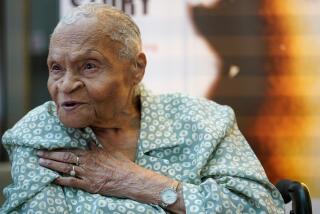Judge Backs Chinese Victims of Japanâs Dumped Weapons
TOKYO â In a ruling that plaintiffsâ lawyers called historic, a Tokyo judge Monday ordered the Japanese government to pay $1.7 million in compensation to 13 Chinese citizens who were injured or whose family members were killed by chemical and other weapons dumped by the Japanese army at the end of World War II.
A Tokyo judge found that Japan had systematically dumped weapons, including poison gas, in China and neglected to help prevent them from injuring and killing people after the war.
âThe government had a responsibility to collect as much information as it could and to supply this to China,â said Yoshihiro Katayama, presiding judge at the Tokyo District Court. âNot fulfilling this responsibility after 1972, when diplomatic relations between China and Japan were restored, was illegal.â
The ruling marks the first time the Japanese government has been ordered to compensate victims of its abandoned weaponry. It was hailed as a total victory by lawyers representing seven injured Chinese and six family members of three other victims.
A spokesman for Japanâs Foreign Ministry called the decision âharsh.â He said the Japanese government would study the ruling carefully before deciding how to respond.
But the plaintiffsâ lawyers called on the government to forgo an appeal, apologize and compensate about 2,000 victims in China.
âIn order to conceal the fact that it had used poison gas in contradiction of international law, the former Japanese army buried poison gas when it fled China or dumped it in rivers and abandoned artillery shells,â the lawyers said. âIn the postwar period, this has led to suffering among ordinary Chinese.â
Plaintiffs, their lawyers and supporters will visit the Japanese parliament today to press for legislation to compensate all the victims of Japanâs abandoned weapons.
Mondayâs ruling contrasted with a court decision in May in which another judge rejected the claims of five Chinese plaintiffs who were injured by abandoned weaponry. The judge ruled that Japan could not be held responsible for failing to clear weapons in territory outside Tokyoâs jurisdiction.
Hitoshi Nakano, a Japanese lawyer representing Chinese war victims, called Mondayâs decision a âsplendid ruling from a brave judge.â
In 1999, Japan pledged to cooperate in clearing China of abandoned chemical weapons. Japan estimates that 700,000 such weapons were left behind after the war. Monday the Foreign Ministry said it wanted to proceed rapidly with that program.
So far, only 36,000 weapons have been cleared. The deadly legacy of the war was seen again in August when a Chinese man was killed and more than 40 people were injured after construction workers in northeastern China handled canisters of mustard gas that had been buried by the Japanese army.
Experts believe that Mondayâs ruling is unlikely to influence numerous other compensation claims arising from Japanâs wartime aggression, whether from Allied prisoners of war, so-called comfort women or victims of atrocities.
The Japanese government has successfully defended such cases by arguing that all compensation claims from the war were settled in treaties.
Satoshi Uesugi, secretary of the Center for Documentation and Research on Japanâs War Responsibility, said Mondayâs ruling was inevitable. âThis kind of case arose because Japan has acknowledged its postwar responsibility for disposal of chemical weapons in agreements, and yet its disposal efforts were so inadequate,â he said.
âThe nature of the Japanese government is very slow to change,â Uesugi said. âBut it is possible that this case will open the way for a hard look at Japanâs past and cause Japanese to accept that people are suffering because Japan failed to deal with the fallout from the war.â
*
Rie Sasaki in The Timesâ Tokyo Bureau contributed to this report.
More to Read
Sign up for Essential California
The most important California stories and recommendations in your inbox every morning.
You may occasionally receive promotional content from the Los Angeles Times.










